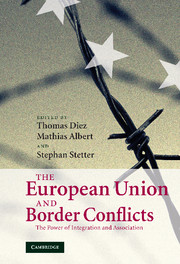Book contents
- Frontmatter
- Contents
- List of tables
- Notes on contributors
- Acknowledgements
- List of abbreviations
- Introduction
- 1 The transformative power of integration: conceptualising border conflicts
- 2 The influence of the EU towards conflict transformation on the island of Ireland
- 3 Catalysis, catachresis: the EU's impact on the Cyprus conflict
- 4 Transforming the Greek–Turkish conflicts: the EU and ‘what we make of it’!
- 5 Border issues in Europe's North
- 6 The EU and the Israel–Palestine conflict
- 7 The EU as a ‘force for good’ in border conflict cases?
- Conclusion
- References
- Index
Introduction
Published online by Cambridge University Press: 22 September 2009
- Frontmatter
- Contents
- List of tables
- Notes on contributors
- Acknowledgements
- List of abbreviations
- Introduction
- 1 The transformative power of integration: conceptualising border conflicts
- 2 The influence of the EU towards conflict transformation on the island of Ireland
- 3 Catalysis, catachresis: the EU's impact on the Cyprus conflict
- 4 Transforming the Greek–Turkish conflicts: the EU and ‘what we make of it’!
- 5 Border issues in Europe's North
- 6 The EU and the Israel–Palestine conflict
- 7 The EU as a ‘force for good’ in border conflict cases?
- Conclusion
- References
- Index
Summary
Integration and peace
At the start of the twenty-first century, European integration is generally seen as not being in the best of shapes. Budgetary quarrels and the persistence of national differences in various policy domains, including foreign policy, dominate the headlines; the majority of voters reject the proposed European Constitution in referenda in two founding member states; the Euro is derided as having made life more expensive after its introduction as a common currency in many member states. Perhaps most importantly, many European Union (EU) citizens (but also academics) believe that this organisation is by its very nature characterised by a democratic deficit (for a discussion of whether there is a democratic deficit or not see Decker 2002; Moravcsik 2002; Schmidt 2004). Put bluntly, against the background of its widespread negative image, why should we bother about this seemingly undemocratic, expensive, wasteful and illegitimate organisation?
Leaving aside the problematic assumptions on which the populist calls for a downscaling of or even withdrawal from the European integration process are based, even those critical of the EU in its current shape usually find at least one core argument that speaks in favour of integration: its contribution to peace. Indeed, all the grand speeches on European integration, past and present, tend to stress that a return to a Europe of nation states without an integration framework would mean a return to the seemingly eternally violent and war-torn centuries before 1945, culminating in the horrors of the Second World War and the Holocaust (see Welch 1999).
- Type
- Chapter
- Information
- The European Union and Border ConflictsThe Power of Integration and Association, pp. 1 - 12Publisher: Cambridge University PressPrint publication year: 2008
- 3
- Cited by

